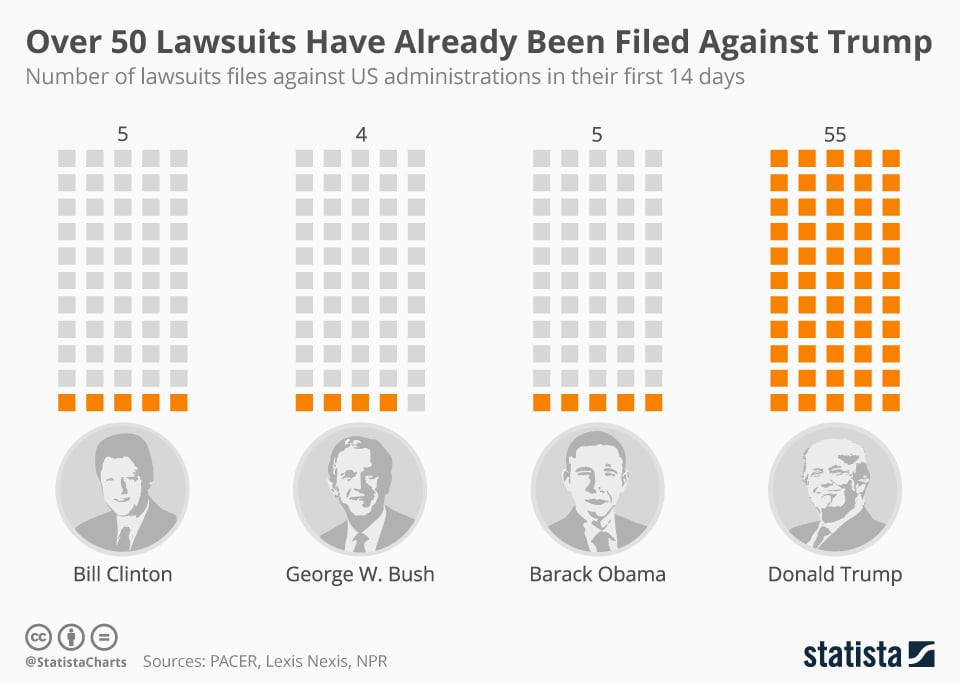Thursday, February 6, 2025. Annette’s News Roundup.
If it looks like a coup, smells like a coup, quacks like a coup . . .
Of course it’s a coup.
Miss the obvious, lose your republic
By TIMOTHY SNYDER
Imagine if it had gone like this.
Ten Tesla cybertrucks, painted in camouflage colors with a giant X on each roof, drive noisily through Washington DC. Tires screech. Out jump a couple of dozen young men, dressed in red and black Devil’s Champion armored costumes. After giving Nazi salutes, they grab guns and run to one government departmental after another, calling out slogans like “all power to Supreme Leader Skibidi Hitler.”

Historically, that is what coups looked like. The center of power was a physical place. Occupying it, and driving out the people who held office, was to claim control. So if a cohort of armed men with odd symbols had stormed government buildings, Americans would have recognized that as a coup attempt.
And that sort of coup attempt would have failed.
Now imagine that, instead, the scene goes like this.
A couple dozen young men go from government office to government office, dressed in civilian clothes and armed only with zip drives. Using technical jargon and vague references to orders from on high, they gain access to the basic computer systems of the federal government. Having done so, they proceed to grant their Supreme Leader access to information and the power to start and stop all government payments.


That coup is, in fact, happening. And if we do not recognize it for what it is, it could succeed.
In the third decade of the twenty first century, power is more digital than physical. The buildings and the human beings are there to protect the workings of the computers, and thus the workings of the government as a whole, in our case an (in principle) democratic government which is organized and bounded by a notion of individual rights.
The ongoing actions by Musk and his followers are a coup because the individuals seizing power have no right to it. Elon Musk was elected to no office and there is no office that would give him the authority to do what he is doing. It is all illegal. It is also a coup in its intended effects: to undo democratic practice and violate human rights.
In gaining data about us all, Musk has trampled on any notion of privacy and dignity, as well as on the explicit and implicit agreements made with our government when we pay our taxes or our student loans. And the possession of that data enables blackmail and further crimes.
In gaining the ability to stop payments by the Department of the Treasury, Musk would also make democracy meaningless. We vote for representatives in Congress, who pass laws that determine how our tax money is spent. If Musk has the power to halt this process at the level of payment, he can make laws meaningless. Which means, in turn, that Congress is meaningless, and our votes are meaningless, as is our citizenship.
Resistance to the coup is the defense of the human against the digital and the democratic against the oligarchic. If Musk controls these digital systems, Republican elected officials will be just as helpless as Democratic ones. The institutions that they voted to create can also be “deleted,” as Musk puts it.
President Trump, for that matter, will also perform at Musk’s pleasure. There is not much he can do without the use of the federal government’s computers. No one will explain this to Trump or to his supporters, of course.
A coup is underway, against Americans as possessors of human rights and dignities, and against Americans as citizens of a democratic republic. Each hour this goes unrecognized makes the success of the coup more likely. (Thinking About, Substack).
The lawsuits must save us.
A Legal Counteroffensive to Beat Back Trump’s Government Purges.

A raft of new lawsuits contend that President Trump and Elon Musk are breaking the law to ransack the F.B.I. and other federal agencies. The courts will now decide.
Workers from across the federal government set off a legal counteroffensive against President Trump and Elon Musk on Tuesday, challenging the legality of efforts to raze their agencies, single them out publicly or push them out of their jobs.
The raft of lawsuits, filed by F.B.I. agents, public sector unions, representatives of older Americans and liberal-leaning legal groups, hinges on fine points of law that deal with matters ranging from the privacy of taxpayer data to intricacies of federal rule-making. But together, they amount to the opening shots in an emerging legal battle over the constitutional order, checks and balances and the founders’ vision of the separation of powers.
It will be up to the courts to decide whether the president has the power to not only direct the executive branch, but also to forcefully recast it in his own image. It may also be up to the judicial branch of government to find a way to ensure that its own decisions are enforced.
In short order on Tuesday, three government unions sued the U.S. Office of Personnel Management, or OPM — the federal government’s human resources division — to block an effort to convince roughly two million federal employees to resign from their jobs early.
Two groups of F.B.I. agents and bureau employees sued to block Mr. Trump from releasing the names of agents and staff members who participated in the investigations into the Capitol riot on Jan. 6, 2021, trying to head off what they fear is a looming purge.
Labor unions and a retirees’ group sued the Treasury Department to restrict access to sensitive Treasury systems that contain the private information of millions of Americans — and that the plaintiffs say may have already been compromised by Mr. Musk’s employees through what he has labeled the Department of Government Efficiency, or DOGE.
Separately, a group of transgender plaintiffs led by advocacy organizations and the American Civil Liberties Union sued to block Mr. Trump’s order to defund gender-transition treatments for people under the age of 19. Two other pending lawsuits seek to block an executive order that would require the Bureau of Prisons to transfer trans female inmates to men’s prisons. On Tuesday evening, one of those suits won a temporary restraining order, signed by Judge Royce C. Lamberth of the District of Columbia. It bars the Justice Department from transferring trans women to men’s facilities or denying them gender-transition treatments, as mandated by one of Mr. Trump’s executive orders.
Earlier, two federal employees, using pseudonyms, sued OPM to block the agency’s access to the email address that sent the governmentwide resignation offer, which was similar to one Mr. Musk had sent to Twitter’s employees after acquiring the company.
The White House press office did not immediately respond to a request for comment.
Collectively, the legal actions seek to check what the plaintiffs see as an unlawful effort — often helmed by Mr. Musk, an unelected billionaire with no formal position — to subvert long-established civil service protections and to grab from Congress its constitutionally mandated control of federal spending.
But they are being pursued against a darkening backdrop of fear and possible intimidation.
“I would argue that there is the potential for physical harm,” Kelly McClanahan, a lawyer for the two federal workers, argued in a hearing on Tuesday, pleading that his clients needed to remain anonymous or risk reprisals from supporters of Mr. Trump and Mr. Musk. “They have a history of putting people on blast, of tweeting out their names.”
At the heart of much of the action is Mr. Musk’s new organization, which is not a department or official division but which has amassed extraordinary power in a matter of weeks, ostensibly to cut costs and reorder the government. An executive order calling for “DOGE teams” to be inserted within each federal agency claims its mission is “to implement the president’s DOGE agenda by modernizing federal technology and software to maximize governmental efficiency and productivity.”
On Monday, Mr. Musk appeared to take credit for shuttering the U.S. Agency for International Development, a 63-year-old agency that funds health and development initiatives around the world. “We spent the weekend feeding U.S.A.I.D. into the wood chipper,” he wrote in a social media post.
Federal employees and their lawyers say Mr. Musk’s staff, some of whom are in their late teens or early 20s, have seized the controls of some of the most sensitive data and information systems at the heart of the federal bureaucracy. These include an official email address that can contact almost all of the government’s two million employees and a system at the Treasury that issues many payments from across the federal government.
Both are the focus of two of the lawsuits. According to one suit, Mr. Musk’s reach at Treasury means his group can access “names, Social Security numbers, birth dates, birth places, home addresses and telephone numbers, email addresses and bank account information about millions of individuals.”
White House officials have repeatedly said the claim is overblown. In a letter to Congress, the Treasury Department said that the Musk group’s access to payment systems was “read-only.”
Another one of the lawsuits, organized by Democracy Forward, a liberal-leaning legal nonprofit, argued that the push for governmentwide resignations is illegal. In their complaint, the plaintiffs argue that the effort ignores civil service rules and promises to reward employees who resign with money that hasn’t yet been appropriated by Congress for that purpose.
In an interview, Skye Perryman, Democracy Forward’s chief executive, accused Mr. Musk and his group of seeking to undo the merit-based system that has been the foundation of the civil service for more than a century, and return the country to a corrupt era when government jobs were handed out as political favors.
“This effort is seeking to revert us back to an unworkable system known as the spoils system,” she said, “one that the country abandoned in the 1800s, because it was not delivering for people.”
A third lawsuit seeks a restraining order to stop the Office of Personnel Management from sending out governmentwide emails from HR@opm.gov until the agency has completed a required privacy assessment. That lawsuit claims that DOGE is planning to conduct mass firings, and that it has brought in outside email servers that are potentially vulnerable to foreign hackers.
The individuals in the cases relating to the F.B.I. and transgender care also filed under pseudonyms. One of the lawyers echoed the worry that releasing the plaintiffs’ names could bring harm to those who use established legal channels to challenge Mr. Trump’s policies.
“It is clear that the threatened disclosure is a prelude to an unlawful purge of the F.B.I. driven solely by the Trump administration’s vengeful and political motivations,” Chris Mattei, a lawyer for the F.B.I. Agents Association, said in a statement. “Releasing the names of these agents would ignite a firestorm of harassment toward them and their families, and it must be stopped immediately.”
The lawsuits came in response to a demand by Emil Bove, the acting deputy attorney general, that the F.B.I. compile and turn over a list of everyone who worked on the Capitol riot cases. That group, the lawsuits estimated, could include as many as 6,000 agents.
The Trump administration has not said it intends to release the identities of the law enforcement officials. The information the F.B.I. provided on Tuesday identified employees by their workplace IDs, their title at the time of the relevant investigation or prosecution and the date of the last action related to the investigation, among other details, but not their names.
But the administration’s demand for names of people who worked on the cases has stoked the belief that it may move to fire them en masse. (New York Times).
The Congress must save us.
The Constitutional Crisis Is Here

If Congress won’t stop Donald Trump and Elon Musk from arrogating its power over federal spending, who will?
By Jonathan Chait
Sometimes a constitutional crisis sneaks up on you, shrouded in darkness, revealing itself gradually. Other times it announces itself dramatically. Elon Musk, to whom Donald Trump has delegated the task of neutering the congressional spending authority laid out in Article I of the Constitution, could hardly be more obvious about his intentions if he rode into Washington on a horse trailed by Roman legions.
“This is the one shot the American people have to defeat BUREAUcracy, rule of the bureaucrats, and restore DEMOcracy, rule of the people,” Musk wrote at 3:59 a.m. today on his social-media platform. “We’re never going to get another chance like this. It’s now or never. Your support is crucial to the success of the revolution of the people.” Here is Musk, as proxy for Trump, casting himself as a revolutionary force and embodiment of the popular will, demanding extraordinary powers to fight some unstated emergency.
Why, exactly, is eliminating these programs right this very instant so important? If, as Musk says, they are teeming with waste and fraud, presumably Congress could pass legislation to reduce or eliminate the problem, and if that were to fall short, it could try again later. Instead, Musk cites a vague crisis that requires suspending normal operations and concentrating power in his own hands. According to various reports, he is holed up in the Eisenhower Building with a small team of young engineers who possess neither government experience nor the authority to question his impulsive judgments, on the hunt for Marxist plots lurking within long-standing federal programs.
The situation exposes a well-known flaw in the design of the Constitution. The Founders, famously, failed to anticipate the rise of political parties. They assumed that each branch of government would jealously guard its own powers, and thus check the others. But political parties created a different incentive system, in which members of the legislative branch can see their role as essentially employees of the president. Trump, who has convinced the Republican base that his interests are indistinguishable from the party’s and transposed his overbearing Apprentice boss persona onto his relations with co-partisans in Congress, is exploiting these incentives more than any other president in history.
In theory, Congress ought to revolt against the prospect of Musk deciding which federal programs should live and which should die. In reality, its Republican members largely share Trump’s goals—and to the extent that they don’t, they correctly fear that opposing him would invite a primary challenge. What’s more, this particular constitutional crisis has an inherent partisan asymmetry. If Trump and Musk succeed in taking the power of the purse from Congress, they will effectively reset the rules of the game in favor of the right. Congress’s spending powers would be redefined as setting a ceiling on spending, but not a floor. A world in which the president could cut spending without exposing Congress to accountability would hand small-government conservatives the opportunity to carry out policies they’ve long desired but been too afraid to vote for.
And so, although a handful of conservative intellectuals, including the budget wonk Brian Riedl of the Manhattan Institute and the law professor and former Bush-administration lawyer Jack Goldsmith, have described Musk’s ambitions as unconstitutional, most of the establishment right has cheered him on or stayed quiet. Senator Thom Tillis of North Carolina conceded that Musk’s project might not be strictly constitutional, but nonetheless told the news site NOTUS that “nobody should bellyache about that.”
Making things even more disturbing is the chaotic legal gray area in which Musk is operating. Musk and his team are working in secret, without hearings or public debate. According to Wired, they gained access to the Treasury Department’s federal payment system, shoving aside the long-time staffer overseeing it and ignoring its safety protocols. Democrats suspect that Musk is breaching numerous federal laws, but without any oversight, it is hard to tell precisely what he is doing. In any case, Musk might not have much reason to care about following the law. Trump has already made plain, by issuing mass pardons and commutations for the January 6 insurrectionists, that he will protect illegal conduct on his behalf.
Meanwhile, Musk has adopted Trump’s habit of deeming opposition to his actions inherently criminal. He has called the United States Agency for International Development, a decades-old program with support in both parties, a “criminal organization.” After an X user posted the names of the young engineers working with Musk, previously reported by Wired, he responded, “You have committed a crime.” The X user’s account has since been suspended.
Reporting on the identities of powerful public officials is, in fact, not a crime—even, or especially, if those officials have assumed public powers without going through formal channels. Musk has nonetheless gotten backup for his threats from Edward R. Martin Jr., a former “Stop the Steal” organizer whom Trump installed as U.S. attorney for the District of Columbia. In a vague but menacing message posted (naturally) on X, Martin warned that “certain individuals and/or groups have committed acts that appear to violate the law in targeting DOGE employees.” Martin declined to identify either the individuals or the laws they’d allegedly broken, nor did he acknowledge that reporting about or criticizing Musk’s work constitutes First Amendment–protected activity. Whether Martin acts upon these threats remains to be seen. In the meantime, however, he is contributing to the atmosphere of menace surrounding Trump and Musk by delivering their threats with a legal sheen, like some kind of MAGA Tom Hagen.
The courts will have the final say over Trump’s audacious power grab. In all likelihood, they will affirm congressional authority to set spending levels authorized by the Constitution. But the Constitution ultimately means whatever five Supreme Court justices say it means. The Court’s more conservative justices often apply the most right-wing interpretation of the text they can plausibly defend, and occasionally one they can’t plausibly defend.
What’s more, Musk seems to have intuited that he can destroy programs and bureaucratic cultures faster than the system can restore them. Firing officials en masse, throwing the people and clients that rely on those programs into confusion and financial risk, and striking fear into the whole federal apparatus can break down the institutions and destroy their institutional knowledge. Rebuilding is painfully slow; destruction is rapid. This may be the dynamic Musk has in mind when he insists that his work must happen “now or never.”
Not even the most committed small-government-conservative lawmaker would design a process like the one now occurring: a handful of political novices, many of them drinking deep from the fetid waters of right-wing conspiracy theorizing, tearing through the federal budget, making haphazard decisions about what to scrap. And indeed, no elected body has designed this process. Trump and Musk have arrogated the power to themselves. The true urgent cause is to return that power to the legislature before the damage becomes irreversible. (The Atlantic)
Something for you to do.
The Public Citzen Lawsuit.
Here’s a quick update on the lawsuit we emailed you about yesterday.
The suit is getting coverage throughout the media — domestically and internationally — from the likes of Axios, Bloomberg, CBS, The Guardian, The New York Times, Newsweek, NPR, Politico, USA Today, and many, many others.
The American Prospect calls it “one of the most important lawsuits in the history of the United States.”
Our original note is copied below in case you missed it.
Public Citizen just filed another lawsuit against the Trump regime.
We are demanding an immediate halt to the massive and patently illegal invasion of privacy being carried out by Elon Musk’s “DOGE” at the U.S. Treasury Department.
This new lawsuit follows the separate one we filed — just moments after Trump was sworn in on January 20 — about how his so-called Department of Government Efficiency is operating in secrecy.
Here are the basics on this new lawsuit:
The Treasury Department possesses sensitive personal and financial information for millions and millions of Americans who send money to or receive money from the federal government.
Federal laws protect such information from improper disclosure and misuse — including by barring disclosure to individuals who lack a lawful and legitimate need for it.
But instead of protecting Americans’ private information as required by law, Scott Bessent — Trump’s jillionaire Treasury Secretary — allowed DOGE full access to the data.
And he punished the Treasury employee who — in accordance with his job duties and the law — tried to protect that information from improper access.
Public Citizen is representing the Alliance for Retired Americans, the American Federation of Government Employees, and the Service Employees International Union in this case, with co-counsel at State Democracy Defenders Fund.
As our new lawsuit spells out, the scale of this intrusion into individuals’ privacy is massive and unprecedented.
This lawsuit demands an immediate end to the systematic, continuous, and ongoing violation of federal laws that protect the privacy of personal information contained in federal records.
If you can, please donate today to support Public Citizen’s work standing up to the Trump regime.
Anything you can chip in — $5 or $25, $50 or $100, $500 or even more — will help at such a critical moment.
THIS IS THE LINK TO “CONTRIBUTE NOW” TO PUBLIC CITIZEN
Or join our popular Monthly Giving program to help make sure we have the ongoing financial resources to fight Trump day after day after day.
If you already donated to help us fight the Trump regime, thank you so much! We didn’t want you to miss out on hearing about this new lawsuit, but please don’t feel any pressure to make another contribution.
Thank you for being part of this shared project called Public Citizen.
For justice,
- Lisa Gilbert & Robert Weissman, Co-Presidents of Public Citizen
The Gaza Fiasco.
When a Real Estate Developer enters the White House.
When Trump uttered his intention to take over Gaza and make it the Riviera of the Middle East, he couldn’t help himself.
One of Trump’s authoritarian model, Hitler, wanted control of land, land, more land, to restore German pride. His current exemplar, Putin, felt and feels similarly. Comparing himself to Peter the Great, Putin aims for the restoration of Russia as an imperial power by means of his Crimean grab and his Ukraine attack.
With Trump, the situation is similar and different. Money. Money. Money. Land is just the means.
Ivanka’s husband, Jared Kushner seems to have put this bee in Trump’s bonnet.
"Gaza's waterfront property, it could be very valuable, if people would focus on building up livelihoods," Kushner said at an event in Harvard in February 2024. Trump’s words yesterday echoed Kushner’s including Kushner’s follow-up thought.”I would do my best to move the people out and then clean it up,” Kushner added in further comments the next month.
These are shallow, ignorant people, with no sense of history. Racism, genocide -all of this talk fits on that spectrum but money, not genocide, is the primary motive for both men. They are not serious enough people to practice genocide. Trump was the author of the Muslim ban, and the attacks on immigrants but from a historical perspective, he is just a casual racist.
“Waterfront property” is what Trump and Kushner see. Tell them that Gaza is a sacred place, the burial place of Hāshim ibn ʿAbd Manāf, great-grandfather of the Prophet Muḥammad and they will stare at you.(Annette Niemtzow)
Trump Officials Try to Walk Back Gaza Takeover Plan

Amid global alarm, top administration officials sought to soften elements of President Trump’s proposal to force Palestinians out of the territory and take it over. Experts said the plan would violate international law.
Top Trump administration officials on Wednesday walked back elements of President Trump’s proposal to “take over” Gaza and drive out the Palestinian population, insisting that he had not committed to using U.S. troops to clear the territory and that any relocation of Palestinians would be temporary.
Mr. Trump’s brazen proposal to move as many as two million Palestinians out of Gaza and seize and redevelop it a U.S. territory met with immediate opposition on Wednesday from key American partners and officials around the world, with many expressing support for a Palestinian state, and experts calling the idea a breach of international law. Less than 24 hours after Mr. Trump floated the plan, top administration officials sought to soften it.
Speaking to reporters in Guatemala, Secretary of State Marco Rubio twice suggested that Mr. Trump was only proposing to clear out and rebuild Gaza, not claim indefinite possession of the territory. Steve Witkoff, the special envoy to the Middle East, told Republican senators at a closed-door luncheon that Mr. Trump “doesn’t want to put any U.S. troops on the ground, and he doesn’t want to spend any U.S. dollars at all” on Gaza, according to Senator Josh Hawley of Missouri.
And at the White House, the press secretary, Karoline Leavitt, said “the president has not committed to putting boots on the ground in Gaza,” though she did not specify how the United States could take control of the territory without using military force.
The Gaza proposal, which Mr. Trump unveiled on Tuesday during a visit by Israel’s prime minister, Benjamin Netanyahu, to the White House, upended decades of international diplomacy and opened a geopolitical Pandora’s box with far-reaching implications for the Middle East. Most immediately, it complicated talks about extending a fragile cease-fire between Israel and Hamas; placed Egypt and Jordan in an impossible position; and threatened the U.S. ambition for normalized diplomatic relations between Israel and Saudi Arabia.
In a statement issued before 4 a.m. local time, Saudi Arabia expressed its “unequivocal rejection” of attempts to displace Palestinians and reiterated that it would not establish diplomatic ties with Israel in the absence of an independent Palestinian state. Egypt’s foreign ministry said that aid and recovery programs for Gaza would have to begin “without the Palestinians leaving.” And King Abdullah II of Jordan, in a meeting with the head of the Palestinian Authority on Wednesday, rejected any attempt to displace Palestinians and annex their land.
Here is what else to know:
Against the law: Mr. Trump’s proposal would be a severe violation of international law, experts say. Forced deportation or transfer of a civilian population is defined as a violation of international humanitarian law, a war crime and a crime against humanity.
Gaza reaction: Palestinians in Gaza expressed a mixture of condemnation and confusion over Mr. Trump’s comments. And while some residents rejected leaving Gaza under any circumstances, others said conditions were so unlivable after 15 months of Israeli bombardment that they would consider relocating.
Israeli embrace: Far-right politicians in Israel welcomed Mr. Trump’s plan as unraveling decades of unwelcome orthodoxy on the Israeli-Palestinian conflict, as well as raising the possibility of negating the militant threat in Gaza without creating a Palestinian state.
Around the world: Mr. Trump brought together allies and adversaries alike in opposition to his proposal, though some sought to strike a balance by not criticizing him directly. (New York Times).
House speaker Mike Johnson defends Trump’s Gaza plan, while other Republicans express doubts.
Other Republican lawmakers, when questioned about the plan on Tuesday evening, grimaced about the comments and declined to respond. Those who did speak appeared skeptical, though they maintained a cautious tone and did not outright dismiss the proposal.
Senator Josh Hawley, Republican of Missouri, said that he did not “think it’s the best use of United States resources to spend a bunch of money in Gaza,” adding that he would prefer that money “be spent in the United States first.”
Senator Lindsey Graham, Republican of South Carolina, said the plan “might be problematic,” but pledged to “keep an open mind.” He added that the United States would “see what our Arab friends have to say about” the president’s proposal.
Arab nations swiftly rejected the plan, which would put some of them — notably Gaza’s neighbors Egypt and Jordan — in an impossible position. Egypt and Jordan are among the top recipients of American military aid but dare not risk alienating their populations by appearing complicit in what many see as ethnic cleansing of Palestinians. Forcing Gazans out of their homes, many Arabs say, would doom a shared desire for Palestinian statehood and destabilize the entire Middle East in the process.
Democrats in Washington were far less circumspect in their outright rejection of the president’s idea.
“It’s a bizarre fantasy,” said Senator Tim Kaine, Democrat of Virginia. “It ain’t gonna happen.” (New York Times).
Rand Paul led the way for many protesting against “boots on the ground.”